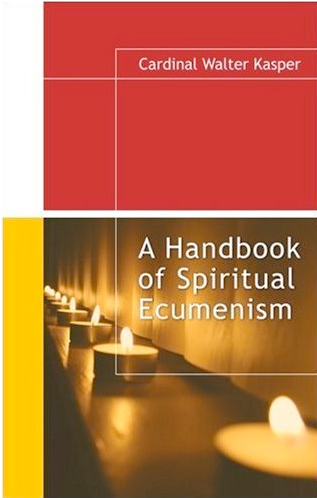 Of late I've been blogging so sparsely I wanted to write some notes this evening, though I well may write more after tomorrow's meeting. I like this Prayer and Worship section a lot; I feel it can serve as a short how-to handbook. Some points that impressed me included on page 45, in the Personal Prayer section, Cardinal Kasper quotes the encyclical Ut Unum Sint: "Prayer should always concern itself with the longing for unity...In this journey which we are undertaking with other Christians ... prayer must occupy the first place." Cardinal Kasper adds, "...prayer for unity remains at the heart of any Christian prayer." On page 47 in the section Prayer in Common I love his saying, "Such prayer might focus on the mystery of the Church and its unity, on Baptism as a sacramental bond of unity, on the renewal of personal and communal life, or on the healing of the brokenness of humanity." On the following page he nicely puts forth the idea of retaining local (and confessional, denominational) particularity in liturgical practice rather than going for a blending mode when Christians from different traditions worship together—non-eucharistically, though I'm beginning to get some sense of the Roman Catholic ideal of shared eucharist as a visible sign of accomplished unity rather than a means or a stage of unity as it is in the Protestant churches. But appropriately, on page 57 he claims the eucharist as the "privileged" place to pray for unity. Cardinal Kasper considers joint public worship events a live possibility on occasions such as he lists on page 49 (you know what they are so I don't need to relist them here). In my first blog on the book I said, "I'm curious about the implications and resonations of the word spiritual with a lower-case "s," though in this chapter I didn't notice the expression "spiritual ecumenism" until I found it on page 53 in conjunction with our common baptism into Christ. I rejoice in and celebrate Cardinal Kasper's idea (page 54) that "An ecumenical affirmation or commemoration of baptism can [among other options] be a welcome occasion for a common catechesis on the mystery and the effects of baptism." But I'll caution that'd work well alongside church bodies of Reformation, Anglican, and Wesleyan heritage, but most likely the discussion would get lost with churches who affirm a sign of grace rather than a means of grace or effective means of grace interpretation of baptism.
Of late I've been blogging so sparsely I wanted to write some notes this evening, though I well may write more after tomorrow's meeting. I like this Prayer and Worship section a lot; I feel it can serve as a short how-to handbook. Some points that impressed me included on page 45, in the Personal Prayer section, Cardinal Kasper quotes the encyclical Ut Unum Sint: "Prayer should always concern itself with the longing for unity...In this journey which we are undertaking with other Christians ... prayer must occupy the first place." Cardinal Kasper adds, "...prayer for unity remains at the heart of any Christian prayer." On page 47 in the section Prayer in Common I love his saying, "Such prayer might focus on the mystery of the Church and its unity, on Baptism as a sacramental bond of unity, on the renewal of personal and communal life, or on the healing of the brokenness of humanity." On the following page he nicely puts forth the idea of retaining local (and confessional, denominational) particularity in liturgical practice rather than going for a blending mode when Christians from different traditions worship together—non-eucharistically, though I'm beginning to get some sense of the Roman Catholic ideal of shared eucharist as a visible sign of accomplished unity rather than a means or a stage of unity as it is in the Protestant churches. But appropriately, on page 57 he claims the eucharist as the "privileged" place to pray for unity. Cardinal Kasper considers joint public worship events a live possibility on occasions such as he lists on page 49 (you know what they are so I don't need to relist them here). In my first blog on the book I said, "I'm curious about the implications and resonations of the word spiritual with a lower-case "s," though in this chapter I didn't notice the expression "spiritual ecumenism" until I found it on page 53 in conjunction with our common baptism into Christ. I rejoice in and celebrate Cardinal Kasper's idea (page 54) that "An ecumenical affirmation or commemoration of baptism can [among other options] be a welcome occasion for a common catechesis on the mystery and the effects of baptism." But I'll caution that'd work well alongside church bodies of Reformation, Anglican, and Wesleyan heritage, but most likely the discussion would get lost with churches who affirm a sign of grace rather than a means of grace or effective means of grace interpretation of baptism.Cardinal Kasper provides words of hope and grace regarding Mixed Marriage Families, and the Roman Catholic Church's two Sacraments of Healing, Penance/Reconciliation and Anointing of the Sick, in which "In certain circumstances and under certain conditions" (page 64) non-Roman Catholic Christians may participate, but if I read the symbolically fine print correctly, I believe he's referring solely to Christians in the Orthodox and Anglican communions, so once again I've officially been excluded. In the short Liturgical Year section Kasper again cites more than two dozen possible occasions for shared ecumenical worship, prayer and related celebrations.
So far I've read only thus far, mostly so I won't bring next month's discussion material into this month's topic, but I'm looking forward to chaper three, Diakonia and Witness. In our local FOW committee we've mainly been discussing documents specifically related to Faith and Order, but several times our committee chairperson has said, "Why not Witness one of these times, since that's part of our name?!"

No comments:
Post a Comment
thanks for visiting—peace and hope to all of us!